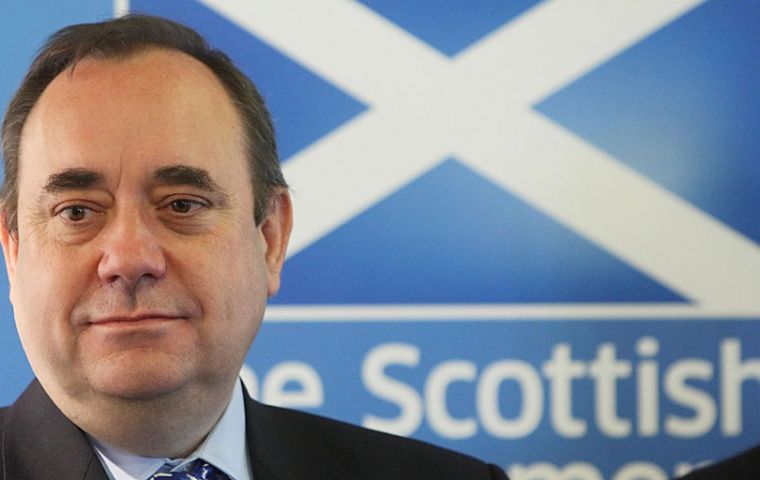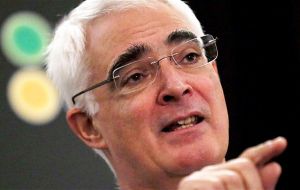MercoPress. South Atlantic News Agency
Scotland's leader wins the pro independence debate, according to The Guardian
 Salmond accused Darling, a former Chancellor of the Exchequer in a Labor government, of being “in bed with the Tories”.
Salmond accused Darling, a former Chancellor of the Exchequer in a Labor government, of being “in bed with the Tories”.  Darling accused Salmond of talking “nonsense” over optimistic estimates of oil and gas revenues, and warned on volatile market prices for commodities.
Darling accused Salmond of talking “nonsense” over optimistic estimates of oil and gas revenues, and warned on volatile market prices for commodities. Campaign leaders clashed over Scotland's future in a lively final TV showdown on Monday, with the pro-independence side counting on a knock-out blow to vault a stubborn gap in the polls.
Pro-independence Scottish First Minister Alex Salmond and 'No' campaign leader Alistair Darling faced off in Glasgow over the key issues of currency, oil reserves and the National Health Service (NHS), on the eve of the start of postal voting on Tuesday.
Following the debate, a snap poll by The Guardian newspaper and polling company ICM suggested Mr. Salmond's score was 71%, against Mr. Darling's 29%.
From the start it was clear that Darling, who won the first debate, was edgy and nervy whilst Salmond was better prepared and more confident.
Scotland's first minister had come prepared to answer the question that damaged him a few weeks ago - what's your Plan B? - if Westminster refuses to share the pound with a newly independent Scotland.
He declared he had not one but three Plan Bs but what he was seeking was a “mandate” from the people of Scotland - a word he repeated again and again - to negotiate to share the pound.
Almost a fifth of voters are expected to begin receiving their ballots by post ahead of the referendum day on September 18.
In his opening statement, Salmond underlined the historic nature of the decision, saying that independence would free Scotland from austerity policies and military spending.
“Absolutely no one will run the affairs of this country better than the people who live and work in Scotland... We are a rich nation and a resourceful people. We can create a rich nation and a more fair society”, Salmond said.
In return, Darling sought to sow doubt in Salmond's vision, saying the details were not clear enough and emphasizing uncertainty over what currency an independent Scotland would use, saying it would affect jobs and interest rates.
Salmond is “asking us to take his word for it on everything. No plan B for anything. Trust what he says? Sorry, I can't,” Darling rebutted.
The pro-independence camp remains 14 points behind according to the latest YouGov poll for The Times, which said 43% of respondents would vote 'Yes' to the split compared to 57% who would vote 'No'.
However, the gap between the two camps appears to have narrowed slightly in recent weeks despite Salmond being perceived to have lost a previous debate as Darling pressured him over currency.
Salmond insists that a vote for independence would give him a mandate to demand a currency union with the rest of the United Kingdom, an idea that the three main parties in Westminster have rejected.
He said a possible alternative option would be using the pound without a formal currency union and hinted this might mean an independent Scotland would not take on its share of Britain's debt.
A lively audience of 200 alternately cheered, applauded and jeered the two campaign leaders as they traded barbs.
Darling accused Salmond of talking “nonsense” over optimistic estimates of oil and gas revenues, and said he did not want the future of Scotland to rely on the volatile market prices for the commodities.
Salmond accused Darling, a former Chancellor of the Exchequer in a Labor government, of being “in bed with the Tories”.
The 'No' camp has underlined doubts over the future of North Sea oil, which would be an independent Scotland's economic lifeblood.
Ian Wood, a well-respected and leading figure in the oil industry, last week warned that the Scottish government's predictions for North Sea oil recovery are up to 60% too optimistic and that it could run out within 35 years.
The debate turned to discussion of the NHS after an audience member enquired what the impact of independence would be on the health service and those with long-term illnesses.
Salmond argued that a split with the rest of the UK would protect Scotland from cuts to health spending, while Darling insisted that funds for the NHS were due to rise.
The 90-minute debate was split into four parts, with sections dedicated to the economy, domestic policy, Scotland's international place, and “what happens after the vote”.
Much of the campaigning in the build up to the referendum has focused on the economy, how easily an independent Scotland could join the European Union and disagreement over how much of the United Kingdom's debt burden it might assume.
Scottish Finance Secretary John Swinney, a member of the pro-independence SNP, on Monday demanded that the “No” camp pull a campaign add claiming that an independent Scotland would be poorer than Pakistan.
Swinney accused “No” campaigners of “deliberately talking down the Scottish economy” after they issued a document entitled “The Facts You Need”, which said an independent Scotland would be the 45th richest country in the world.




Top Comments
Disclaimer & comment rules-

-

-

Read all commentsI guess they will use sterling the same way Argentina uses the dollar, maybe they can get some economic tips from Argentina because their economic standing will be quite similar if they default on their debt.
Aug 26th, 2014 - 07:26 am 0Shadowing the pound with their own toilet paper peso, good luck Scotland lol
I watched the debate and Salmond did indeed certainly appear to have the edge in this debate.
Aug 26th, 2014 - 08:20 am 0What shocked me the most however was Salmond's inability to answer some of the financial questions.
I'm not sure if he didn't understand the subject or was directly misleading the audience but either way he seemed to be declaring Scotland could use the pound and all would be fine! Scotland can indeed continue to use the currency however Scotland would do so at great cost of not having any financial reserves or to be able to do basic things like set interest rates. Under these conditions London still clearly has control of Scotland's finances.
Yup Scotland could of course keep the Pound - BUT - without the Bank of England as last resort it would just be a paper Scottish Pound and wortheless - as wold be demonstrated by the flight of capital, banks, ins companies,pension funds etc to England pretty fast!
Aug 26th, 2014 - 08:36 am 0Commenting for this story is now closed.
If you have a Facebook account, become a fan and comment on our Facebook Page!